SWEDISH SOUTH ASIAN STUDIES NETWORK
Visit to the Indian Institute of Technology Bombay (IITB),
Thursday
15 November 2007
Web page: http://www.iitb.ac.in/
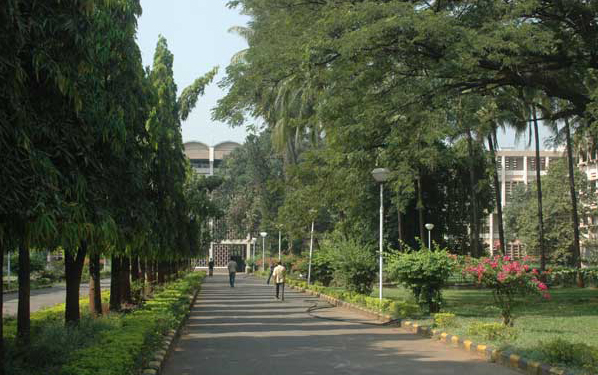 IIT Bombay, established in 1958, is located at Powai, a northern suburb of Mumbai, on the banks of the Powai Lake.
IIT Bombay, established in 1958, is located at Powai, a northern suburb of Mumbai, on the banks of the Powai Lake.
It is one of the seven IITs in India (see a list of all IITs). Today IITB is recognised as one of the most prominent centres of academic excellence in India. Over the years, there has been dynamic progress at IIT Bombay in all academic and research activities, and a parallel improvement in facilities and infrastructure, to keep it on par with the best institutions in the world. Institutes in positions of excellence grow with time.
IITB is a small township in itself. Consciously developed, the campus has retained and increased its green cover, rich in natural flora and fauna.
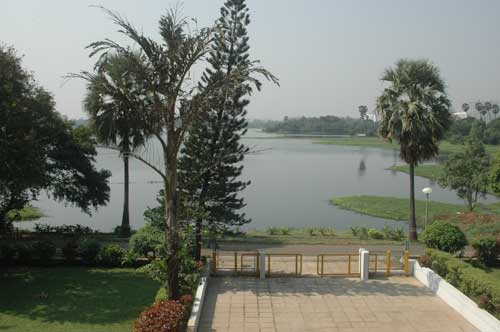 Most facilities are available on campus itself, including a bank, a shopping centre, two excellent schools for children, and a well equipped hospital. All students and most faculty live on campus, in student hostels and IIT staff quarters. The peaceful atmosphere of the campus belies the full range of activities going on that complement academic life.
Most facilities are available on campus itself, including a bank, a shopping centre, two excellent schools for children, and a well equipped hospital. All students and most faculty live on campus, in student hostels and IIT staff quarters. The peaceful atmosphere of the campus belies the full range of activities going on that complement academic life.
Several Swedish universities, and especially the Royal Institute of Technology (KTH) in Stockholm, have had formal and informal collaboration with IIT Bombay and its researchers.
Even some Swedish students have attended courses at IITB, e g the KTH student Markus Kirsten who spent a year in Mumbai in 2005, and presented his experiences at SASNET’s workshop on
”The Role of South Asia in the Internationalisation
of Higher Education in Sweden” (held in Stockholm in November 2006). Read his report (as a pdf-file).
Among specific Indo-Swedish research projects connected to IITB already known to SASNET, should be mentioned the arsenic research by Dr. D. Chandrashekharam, Department of Earth Sciences, IITB, carried out in collaboration with Dr. Prosun Bhattacharya, Department of Land and Water Resources Engineering, KTH. During our visit to IIT Bombay, Dr. Chandrasekharam happened to be abroad, and no meeting could be held at his department.
Other Swedish researchers involved in collaborative projects with colleagues at IITB include Dr. Devdatt Dubhashi and Dr. K. V. S. Prasad, Department of Computer Science and Engineering, Chalmers University of Technology, Göteborg; and Prof. Rajni Hatti Kaul, Dept. of Biotechnology, Lund University. They had all kindly assisted us in finding contacts at IITB.
Our programme for the day had been organised by Prof. Pradipta P. Banerjee, Dean for International Relations, and included separate meetings at the departments of Civil Engineering, Computer Science and Engineering, Humanities and Social Sciences, and Electrical Engineering.
Meeting at the Dept. of Civil Engineering
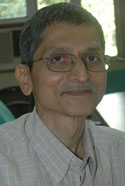 |
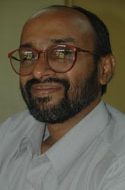 |
| M.C. Deo and T.I. Eldho. | |
People we met:
Professor M.C. Deo, Head of Dept.
Associate Professor T.I. Eldho
Assistant Professor Manne Janga Reddy
Assistant Professor Rajib Maity. Personal web page: http://www.facweb.iitkgp.ernet.in/~rajibmaity/
Dr. Eldho was our contact person at the Dept. of Civil Engineering. We had met him by chance in Stockholm in August 2007, when he was attending as a delegate to the World Water Week 2007. He had kindly invited us to his department for a meeting with his colleagues, who were all eager to promote students exchange programmes and joint degree programmes with Swedish universities, like they already have with universities in Singapore and Australia.
Meeting at the Dept. of Computer Science and Engineering
People we met: Professor Abhiram Ranade
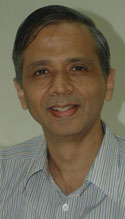 We proceeded to the Dept. of Computer Science and Engineering, a result of a merger six months earlier between the School of IT and the Dept. of Computer Science. This is the department that is involved in collaboration with Chalmers. Prof. Ranade (photo to the right) obtained his PhD from Yale in 1988, where the Swedish professor Lennart Jonsson was his supervisor.
We proceeded to the Dept. of Computer Science and Engineering, a result of a merger six months earlier between the School of IT and the Dept. of Computer Science. This is the department that is involved in collaboration with Chalmers. Prof. Ranade (photo to the right) obtained his PhD from Yale in 1988, where the Swedish professor Lennart Jonsson was his supervisor.
We had an interesting discussion regarding corporate funding for research, since this department and other Indien computer science departments has several agreements with foreign computer companies like IBM, Microsoft and Google, funding research programmes and giving out awards.
We also discussed the brain drain phenomena. Prof. Ranade says that a large number, up to 50 %, of the Indian researchers who go abroad to further their careers nowadays return to India after a few years. Still, its is problematic for IITB to get really good PhD students, since the best ones head for America, and once they return back home they do not go for IIT. Instead they get lucrative positions in financial institutions or with multinational corporations.
A viable solution to break this negative trend might, according to Prof. Ranade, be to promote more student exchange programmes.
------------------------------------
On behalf of Prof. Pradipta P. Banerjee, Dean for International Relations, who was absent during the day, Ms. Shyamala Iyer, Executive Officer at the Dean’ office, took us around for a short sightseeing of the beautiful IIT campus, and we were offered a nice buffet lunch at the IIT guest house restaurant.
-----------------------------------
Meeting at the Dept. of Humanities and Social Sciences
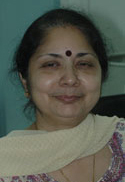 |
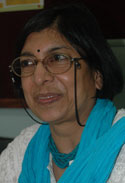 |
| Meenakshi Gupta and Neelima Talwar. | |
People we met:
Dr. Meenakshi Gupta, Professor in Psychology & Head of Dept.
Dr. Neelima Talwar, Professor in English drama
After lunch we visited the Dept. of Humanities and Social Sciences. Coming from Sweden with a strict differentiation between technological universities/faculties and general universities, it is refreshing to note that all the IITs in India extend their ambition to also include humanity and social science studies.
We met in Prof. Gupta’s office, and she presented the research and education within the department. The disciplines taught include Psychology, Sociology, Philosophy, Economics, Women’s Studies, and English. A PhD programme with 150 students is going on.
Meeting at the Dept. of Electrical Engineering
People we met:
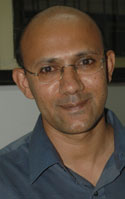 Dr. Vishwesh Kulkarni. Also Visiting Assistant Professor at University of Southern California
Dr. Vishwesh Kulkarni. Also Visiting Assistant Professor at University of Southern California
For our last meeting we had to search the entire building where the Dept. of Electrical Engineering is located, since it turned out be at least three professors with the same name family name. But eventually we managed to trace the right Dr. Vishwesh Kulkarni (photo to the right) and had an inspiring discussion with him on his area of research, which is telemedicine/using cell phones for health care. Since 2001, he is working most of the time in America, where he defended his PhD at the University of Southern California. He has then worker at MIT and done postdoc research in Colorado. Since 2005 he is working for a company in Boston.
Quite unexpectedly, we learnt that Dr. Kulkarni has Swedish research collaboration partners. He is working with Dr. Ulf Jönsson at the Division of Optimization and Systems Theory, Dept. of Mathematics, Royal Institute of Technology (KTH) in Stockholm since 2002, and has also been working with Prof. Anders Rantzer at the Department of Automatic Control, Lund University.
SASNET - Swedish South Asian Studies Network/Lund
University
Address: Scheelevägen 15 D, SE-223 70 Lund, Sweden
Phone: +46 46 222 73 40
Webmaster: Lars Eklund
Last updated
2011-02-01
